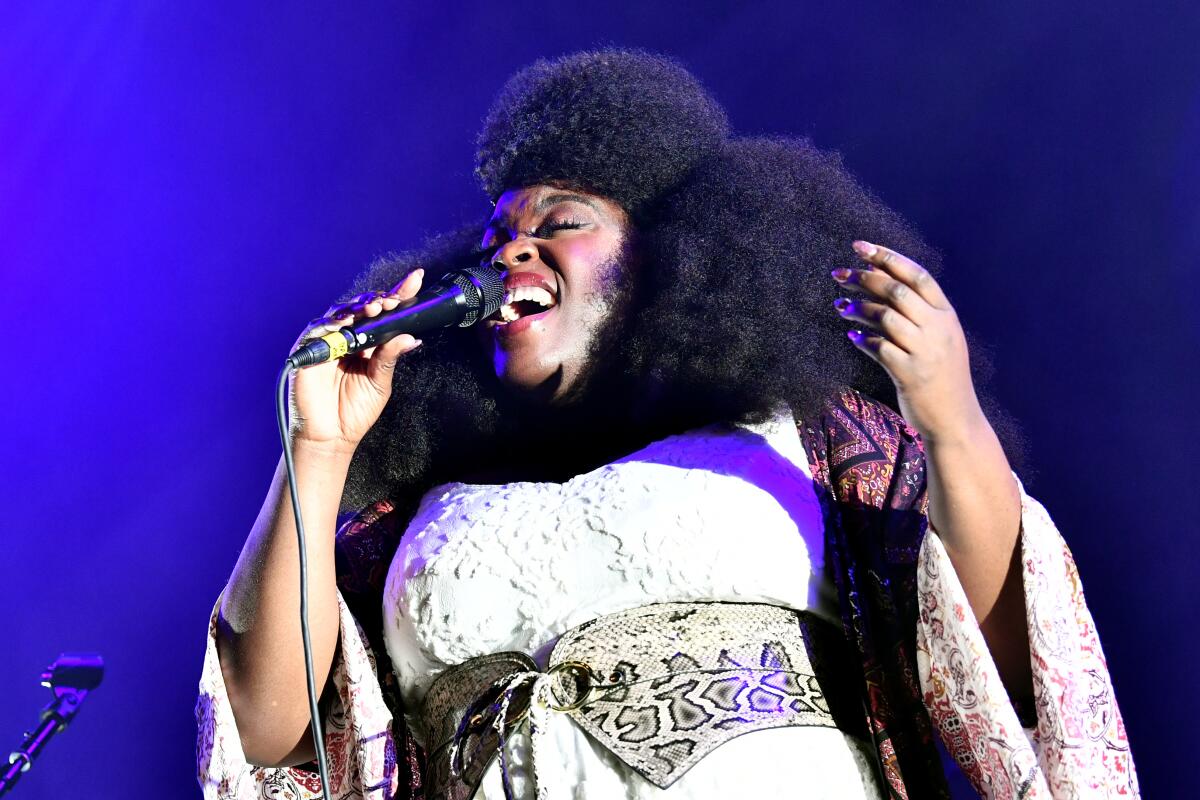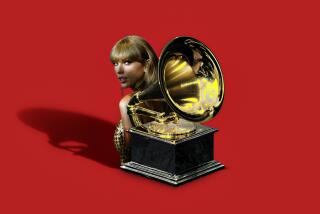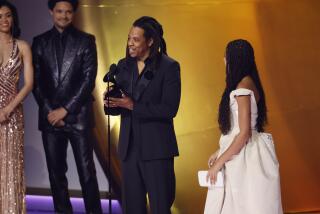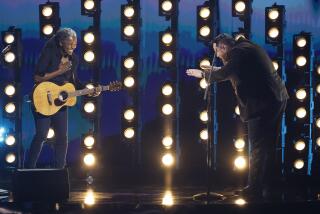At pre-Grammy parties for rising stars and power players, ‘Dugan-gate’ is talk of the town

Days before this Sunday’s Grammy Awards ceremony, the music industry was doing what it could to kick the self-congratulation into high gear.
At a party thrown by Spotify in West Hollywood on Thursday night, 18-year-old Billie Eilish sang an acoustic rendition of her smash hit “Bad Guy” — nominated for both record and song of the year — and Rosalía led a crew of white-clad dancers through a set that made clear why the Spanish electro-flamenco star is up for best new artist.
Meanwhile, many of the industry’s power players gathered for a Billboard event honoring the executives who helped steer the business toward double-digit growth in 2019.
Yet offstage few were talking about anything other than the escalating battle between the Recording Academy and its recently ousted chief executive, Deborah Dugan, involving explosive claims of corruption, gender discrimination and voting irregularities.
The result is a Grammy Week like none other, with the usual celebration overshadowed by gossip regarding the latest developments and widespread uncertainty about how it all may affect the Grammys telecast from Staples Center on Sunday night.
Insiders with valuable relationships to protect were unwilling to be quoted on the subject; many insisted they hadn’t yet learned enough to comment.
“One, we don’t know anything. Two, we don’t know anything. And three, we don’t know anything,” said Yola, the British country-soul singer nominated for best new artist, at the Spotify bash.
“We’ve tried our best to keep up with it, but there’s so much he-said/she-said to grasp what’s happening,” added Adrian Quesada, another best new artist nominee with the duo Black Pumas.
Privately, though, virtually all agree that the messy situation — the phrase heard repeatedly at the Billboard event combines an expletive with the word “show” — is diverting focus from a diverse field of Grammy nominees that had been hailed as a sign of progress for an academy long viewed as being out of touch with modern music.
The weeklong run-up to music’s premier awards show has seen tumult before, as when Chris Brown was arrested for assaulting Rihanna in 2009 or when Whitney Houston died unexpectedly at the Beverly Hilton in 2012. But never has the institution itself been so shaken as it is now.
The drama began last week when Deborah Dugan, hired less than a year ago as the academy’s first female chief executive, was suspended in the wake of what the organization called “a formal allegation of misconduct.” Dugan — who’d replaced the academy’s longtime boss, Neil Portnow, following a controversy related to the Grammys’ perceived bias against women — fired back with a 44-page complaint of her own in which she detailed a rigged nomination process and said that a musician had accused Portnow of rape.
Dugan also alleged that she’d been sexually harassed by Joel Katz, a high-profile lawyer whose clients have included the Recording Academy. (Portnow and Katz have denied the accusations.)
The Grammys were roundly commended when nominations, as announced in November, highlighted work by women and people of color including Eilish, Lizzo, Lana Del Rey, Lil Nas X, H.E.R. and Tyler, the Creator. In contrast with Portnow’s 17-year reign — during which many observers criticized the academy for consistently rewarding aging white rockers — some sensed the beginnings of Dugan’s stated ambition to make the Grammys more inclusive.
Said Yola of the recognition of her work: “I made the decision to push beyond what’s expected of women of color. To me that makes [the nomination] even more meaningful.”
Yet Dugan’s claims about the academy’s voting process have called even those advancements into question. In her complaint to the Equal Employment Opportunity Commission, the former CEO said the nominations were manipulated by academy board members seeking to help themselves or their associates and by the Grammys’ longtime TV producer, Ken Ehrlich. (Ehrlich, who plans to step aside after this year’s show, told the New York Times, “There is no truth to what she alleges.”)
How — or whether — any of this will be reflected in Sunday’s telecast is unclear. Taylor Swift, who’d been expected to perform on the show, will not attend the ceremony — a possible indication that artists are considering how closely they want to be aligned with the academy.
One publicist, when asked if they’d allow their clients to address the Dugan matter on the red carpet, said, “Sure, as long as I tell them exactly what to say.”
Dugan herself said in an interview before she was suspended that she would appear on the Grammys (as Portnow did every year) only in the event that she had something “important” to say. Her interim replacement, Harvey Mason Jr., may view Sunday’s event as an opportunity to publicly address the recent chaos, though he was a no-show at Thursday’s Billboard party, where he’d been scheduled to introduce an appearance by veteran record executive Clive Davis.
After accepting Billboard’s award as executive of the decade, Universal Music Group Chairman and Chief Executive Lucian Grainge gave a pained look when asked by The Times about the week’s developments.
“I’m just focused on our artists,” he said. “That’s what I have to do.”
Times pop music editor Craig Marks and Times staff writer August Brown contributed to this report.
More to Read
The biggest entertainment stories
Get our big stories about Hollywood, film, television, music, arts, culture and more right in your inbox as soon as they publish.
You may occasionally receive promotional content from the Los Angeles Times.







